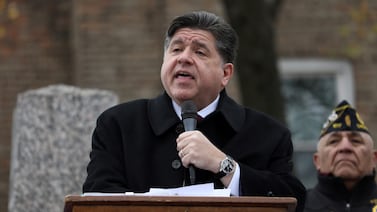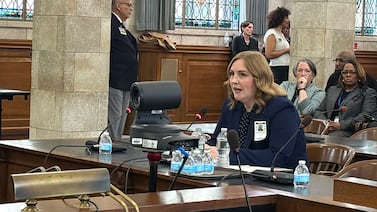Nearly two months after it started, the landmark fair funding trial underway in Harrisburg is shaping up as a battle over defining educational “must-haves” vs. “nice-to-haves.”
The trial, which has the potential to overhaul how education is paid for in Pennsylvania, resumed Thursday after a two-week holiday hiatus. Jane Harbert, who retired in 2020 after seven years as chief of schools and four years as superintendent of the William Penn School District, spent the entire day on the stand.
Six districts, including William Penn, along with three families and two statewide advocacy organizations, have sued the state alleging that its system of funding education is discriminatory and unconstitutional. The state has among the widest per-pupil spending gaps among wealthier and poorer districts in the country and ranks 45th in the percentage of education costs paid by the state.
Harbert, like educators from other plaintiff districts called as witnesses before her, was compelled under cross examination by attorneys for Republican legislative leaders to defend achievements in her school district. Attorney Patrick Northen, representing House Speaker Brian Cutler, cited many – including a debate team that has bested those from more affluent areas, a host of middle school sports teams, and a national award for increasing Advanced Placement offerings – as evidence that the district is doing fine with current resources.
Harbert repeatedly said she believed although the district had its share of success stories, many students are being denied the opportunities they deserve. Despite being able to offer many AP courses, she said, without early intervention and extra services when they are younger, many students cannot access those courses.
“We have done great things, but the reality we face on a regular basis is, we don’t have the funding we need,” Harbert said.
This is despite having the highest local tax effort (as measured by the amount raised compared to total property values) of any district in Delaware County and the second highest in the state, Harbert said under questioning by Public Interest Law Center attorney Dan Urevick-Ackelsberg. Mandated costs, such as pension contributions and charter school reimbursements, far outrun the available resources or the ability to tax residents, she said.
In William Penn, which encompasses six towns on the southwest border of Philadelphia, four of five students are low-income.
“Our students come in with learning gaps, those need to be addressed at a very early age,” she said, but the district doesn’t have enough funds to apply the needed interventions.
Northen highlighted William Penn’s accomplishments and sought to get Harbert to acknowledge there is a difference between what educators would like to have in their districts and what is constitutionally required. Urevick-Ackelsberg objected, saying Harbert is not an attorney, and she didn’t answer.
The Pennsylvania constitution, like those in several states, mandates a “thorough and efficient” system of education “for the good of the commonwealth.” How to define that is at the core of what Commonwealth Court Judge Renée Cohn Jubelirer must decide.
The trial, expected to last a total of eight to 10 weeks, resumed after a break that saw an exchange between a prior witness and attorney John Krill, who is representing Senate President Jake Corman, have its moment on social media.
During the cross examination of Matthew Splain, superintendent of the rural 600-student Otto Eldred school district and board chair of the Pennsylvania Association of Rural and Small Schools, Krill suggested that many activities offered by school districts, including arts and music, are not required under the “thorough and efficient” definition. He criticized the state’s proficiency standards in math and reading, which apply to all students, questioning why a carpenter needed to know biology, or why someone on “the McDonald’s career track” needs to learn algebra.
“Lest we forget, the Commonwealth has many, many needs,” Krill told Jubelirer after a plaintiff attorney lodged an objection to his line of questioning. “I think there is a need for retail workers, people who know how to flip pizza crust. My point is, do these proficiency standards actually in any way imaginable serve the needs of the Commonwealth such as they should be mandatory across the board? I think the answer is no.”
In response, Splain described a high school band where high achievers and special education students played together.
“Tell me that’s not a must-have, that those kids don’t need that,” Splain told the court, a catch in his voice.
Urevick-Ackelsberg picked up on that thread during Harbert’s testimony Thursday, asking her if she thinks all students, regardless of any future career, need critical reading, writing, and math skills.
“We are not the sum of the career that we choose,” she said. “Everybody needs critical thinking skills so they can read a novel, make good decisions about health, good decisions about where they want to work, where they want to be. They need critical thinking, writing, math and reading skills for all careers and for their personal life, too.”
Harbert’s cross examination continues Friday.




